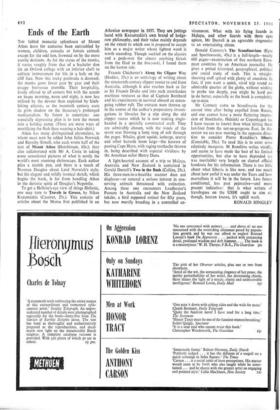Ends of the Earth
THE fabled monastic splendours of Mount Athos have for centuries been untroubled by women, children, eunuchs or female animals except for the odd hen, frowned on by the more ascetic denizens. As for the status of the monks, it varies roughly from that of a bachelor don (in an Oxford college with an inferior chef) to solitary immurement for life in a hole on the cliff face. Now this rocky peninsula is doomed; the monks grow fewer year by year and their craggy buttresses crumble. Their hospitality, freely offered to all corners but with the accent on beans morning, noon and night, is now less utilised by the devout than exploited by -hitch- hiking atheists, as the twentieth century casts its grim shadow on the theocracy's prolonged mediaevalism. Its future is uncertain: one especially depressing plan is to turn the mount into a holiday camp. (There are more ways of mortifying the flesh than wearing a hair-shirt.) Athos has many distinguished chroniclers, to whom must now be added John Julius Norwich and Reresby Sitwell, who each wrote half of the text of Mount Athos (Hutchinson, 63s.); they also collaborated with Mr A. Costa in taking some sensational pictures of what is surely the world's most stunning shrinescape. Each author plies a nimble pen, and there is a touch of Norman Douglas about Lord Norwich's style; but his elegant and mildly ironical sketch, which begins the book, is far from handling Athos in the derisive spirit of Douglas's Nepenthe.
To get a Hellene's-eye view of things Hellenic, one may turn to Travels in Greece, by Nikos Kazantzakis (Cassirer, 25s.). This consists of articles about the Morea first published in an Athenian newspaper in 1937. They are jottings laced with Kazantzakis's own brand of hedge- row philosophy, and their value mainly depends on the extent to which one is prepared to accept him as a major writer whose lightest word is worth recording. Though suckled on the classics and a push-over for almost anything Greek from the Iliad to the bouzouki, I found them on the barren side.
Francis Chichester's Along the Clipper Way (Hodder, 35s.) is an anthology of writing about the nineteenth-century clipper routes to and from Australia, although it also reaches back as far as Sir Francis Drake and into such unorthodox maritime ventures as that of Captain Bombard and his experiments in survival aboard an ocean- going rubber raft. The extracts were thrown up in the course of the author's preparatory investi- gations in libraries for a trip along the old clipper routes which he is now making single- handed in a specially constructed craft. They are admirably chosen, with the winds of the seven seas blowing a lusty tang of salt through the pages. Whales, giant squids, icebergs, scurvy and other hazards loom large—the horrors of passing Cape Horn, with raging toothache thrown in, being described with especial vividness by the American sailor Henry Dana.
A light-hearted account of a trip to Malaya, Australia and New Zealand is contained in Gerald Durrell's Two in the Bush (Collins, 25s.). His three-men-in-a-boatlike manner does not displease—or conceal a serious interest in con- serving animals threatened with extinction. Among these one encounters Leadbeater's Possum in Australia and the New Zealand takahe, a bird supposed extinct for fifty years, but now merrily breeding in a controlled en- vironment. What with his flying lizards in Malaya, and other lizards with three eyes apiece, Mr Durrell is an agreeable ringmaster to an entertaining circus.
Donald Connery's The Scandinavians (Eyre and Spottiswoode, 45s.) is a full-length—nearly 600 pages—examination of five northern Euro- pean countries by an American journalist. He gives a potted historical, geographical, political and social study of each. This is straight- shooting stuff spiked with plenty of anecdote. In fact, if you want a quick, vivid trip round an admirable quarter of the globe, without wishing to probe too deeply, you might be hard put to do better, especially as the book is completely up-to-date.
Mr Connery came to Scandinavia for the second time after being expelled from Russia, and one cannot have a more flattering impres- sion of Stockholm, Helsinki or Copenhagen (as I have reason to know) than when hitting them hot-foot from the not-so-gorgeous East. In this review we are now moving in the opposite direc- tion to consider Pierre Rondibre's Siberia (Constable, 35s.). To read this is to enter terra relatively incognita. M Rondiere writes vividly, and seems to have made the best of his limited opportunities, but also to have depended (as was inevitable) very largely on slanted official handouts for his information. There is too little about what Siberia is like now, and too much about how awful it was under the Tsars and how marvellous it will be in the future. Less future conditional, less past pejorative—and more present indicative : that is what writers of travelogues on the USSR ought to aim at; though, heaven knows, it's uphill work.
RONALD HINGLEY














































 Previous page
Previous page